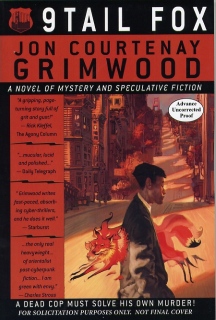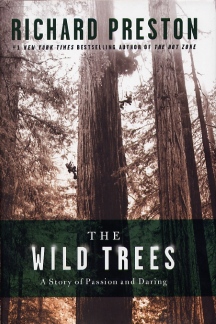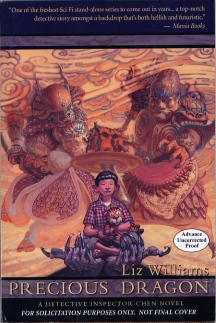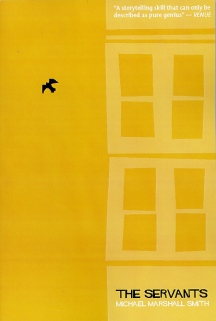|
|
|
|
This Just In...News From The Agony Column
|
|
04-21-07: Preview for Podcast of Monday, April 23, 2007: "You have to be a fake before you can be real."
Here's
an MP3 preview
of the Monday April 23, 2007 podcast for The Agony Column. Enjoy!
|
|
04-20-07: Jon Courtenay Grimwood's '9Tail Fox'
and Liz Williams 'Precious Dragon'
|
Nightshade Brings Home The Dead
 |
|
| Not
the final cover, but a nice illo. |
Few writers are as uncategorizable as Jon
Courtenay Grimwood. His prose
style is sparse and powerful, with a dense literary feel that immediately
immerses the reader. You never feel that he's introducing you to
a situation or building up to something. You are simply there. His
plots include
well ... anything. You may be popped from the unimaginably distant
future into a gritty present and wonder what the hell the two have
to do with
one another until each point is revealed as a pearl on a necklace,
a piece in a puzzle. The great pleasure with Grimwood's novels is that
he trusts the reader to put it all together, and that makes the reading
experience of his work very intense and very enjoyable.
Over the UK, Grimwood is reliably published by Victor Gollancz; first
in a nice hardcover, then in a trade paperback. Simon Spanton, his
editor, never knows what sort of book he is going to get beyond the
next Grimwood
novel. Here in the US, things are considerably more complicated for
this talented author. Once in a while, we'll get a trade paperback
original
from Bantam Spectra, who last released 'Stamping
Butterflies'. That
novel fit quite well into their SF line, but there's that word – "line" – and
Grimwood is quite adept at crossing them with complete aplomb.
Thus, we can thank our lucky stars that Night Shade Books will be bringing
us '9Tail Fox' (Night Shade Books ; July 5, 2007; $14.95). It's a perfect
fit for this maverick publisher, a genre-defying work that simply is.
But it does have a movie-perfect hook, emblazoned on the cover of the
ARC: "A
dead cop must solve his own murder!" That alone, I would think, would
make Random House, the überpublisher of Spectra, want this novel.
It's the sort of hook that can sell a lot of novels, and best of all,
'9Tail Fox' is Grimwood's most accessible novel yet, living up to the
promise
of its premise. It's a classic, easy-to-grasp last chance to dance.
Bobby Zha is a something of a loner in the SFPD. Working a case, he's
murdered,
but before he can die he is brought back to life by a celestial fox
and offered a chance to set things right. There's even a very nice
science
fiction nugget buried here amidst the mysticism that infuses not just
this novel but Grimwood's writing in general. Still, his is essentially
a very
down-to-earth and gritty mystery that will appeal to fans of the mystery
genre even though it does include a soupcon of the supernatural. And
horror fiction readers will love it. You
can read my original review here. This
is the perfect novel introduce you to a unique talent, a book that
will send on return trips to track down the rest of this author's work.
The
obvious question is, who is going to snag 'End
of the World Blues'?
|
|
Precious,
oh so precious. Where are the Pretenders when you need
them?
|
Chances are that
you'll find it directly in the vicinity of Night Shade's other oriental
supernatural mystery hybrid, Liz Williams' 'Precious
Dragon' (Night Shade Books ; July 15, 2007 ; $24.95), the newest hardcover
original
entry
in her Inspector Detective Chen series. Williams' work is firmly
rooted
in the world of fantastic fiction, but played out as a gritty mystery.
Given that DI Chen's partner is a demon, there's certainly more than
a soupcon of the supernatural to be found here. Especially in this
third
novel, wherein Chen and Zhu Irzh are asked to escort an emissary from
Heaven on a diplomatic mission to Hell. If that is not enough to whet
you reading
appetite, add in the titular baby, 'Precious Dragon' born to parents
who reside in Hell but sent to Singapore Three. Clearly this is no
picnic for
anyone involved.
Once again, Williams offers us mysteries both human and supernatural,
with a wonderfully conceived mythology that is chock-a-block with monsters.
I like monsters. I like Liz Williams' monsters a lot, and you add those
into a pulse-pounding, character-driven mystery, and you get well,
stuck
to a chair for a day or two, with a film playing on the screen in your
brain that offers incomparable special effects.
Now, I know, I've got to admit that both of these books sport blurbs
that have my name attached. (And that's gusto meant to be on the '9Tail
Fox'
blurb.) There's a reason for that. I run this shebang and I get to
pick the books I read. I've decided that I want to only read good books.
Life
is short, why waste my time? I can figure out if a book is good or
bad pretty easily. I'm presuming that you, the readers, are looking
for good
books as well. Let me note that when paid cold hard cash, I'll read
a bad book. A certain climatologically oriented novel comes to mind.
But here
are two damn good books – assuming, of course, you like your
mysteries to include oriental and supernatural elements. Frankly neither
one of these
authors is easy to pigeonhole. We'll just put them in that catchall
category -- great books, well worth your money and time, the latter
being far more
precious.
|
| |
|
04-19-07: Michael Marshall Smith Returns With 'The Servants'
|
"No-one happened to be watching"
|
|
Out
the window. In the door. Elsewhere.
|
Michael
Marshall Smith. Michael Marshall Smith. Welcome back, man, it's
great to have you here.
Yes, we liked your 'Straw
Men' series of thrillers, with their unified
conspiracy theory of serial killing, their darker-than-dark tone leavened
by your witty prose. But for my money, your weird, surreal novels of the
fantastic and science fictional are the bee's knees, the tops, the Coliseum.
Starting with 'Only
Forward', you forged a weird-as-heck path down which
no writer had journeyed before. Those are the paths I like the best. Sure,
you can mop the floor with bloodied scalp of a certain serial killer who
passed his prime and came out the other end of the Hollowood pipe. You've
got that evil vibe down to a science. Let me tell you, my mother and my
sister and my sister's husband all LOVE those books, and that's just the
iceberg tip of a huge audience. Congratulations!
And with regards to Hollowood, I feel your pain. Smarmy & Pabulum
sucked up the rights to your outstanding, surreal trans-dimensional
novel of war
and body parts, 'Spares', only to transmogrify it beyond recognition
into yet another title best left unspoken. So far, nobody's managed
to mangle
your reality-dissolving 'One
of Us', though as I recall, S&P
were falling over themselves in their efforts to get the rights to
do so.
Let's hope
it stays that way, un-fixed and produced with the wildly creative
special effects that any reader worthy of the name brings to a great
work of
the fantastic when they read it.
But looking back at the review I wrote, I can see it was nearly ten
years ago when it was published, man, TEN YEARS! How could we survive
without
the prose drug you pumped into our bloodstreams? Yes, 'The
Vaccinator'
was a great fix about a fixer, a Vaccinator who can protect anyone
from anything so long as he's not protecting a writer from Hollowood.
Those
damn aliens from the lower half of the left coast, they’re
savage. They're like literary locusts, stripping properties and potential
readers
of the glowing, glowering vistas of madness and wonder you so excellently
explore in your books.
|
|
| Alex
McVey deconstructs the world of The Servants even as they
deconstruct ours. |
While the Michael Marshall version of you prepares to rule the world
with 'The Intruders' (William Morrow ; August 7, 2007 ; $24.95),
with
which
your USAian
publishers finally get round to giving you a hardcover original,
Michael Marshall
Smith returns in glorious Weird-O-Rama with 'The Servants'
(Earthling Publications ; July 2007 ; $30). Yep, the limiteds are
already gone,
damn my eyes. But
there's still time for astute readers to pop on over the Earthling's
website and reserve a copy of the trade hardcover. It's illustrated,
so we're told,
by Alex McVey. Readers can check
out his website here, and figure out
that we're in good hands. So, small press, illustrated, we're already
good before
we even get to the good part.
The falling-apart part.
Unless you're in London, which goes on forever. But Mark, who is about
to meet 'The Servants', has been shunted out of London to Brighton, from
metropolis to beach town, from endless renewal to ceaseless decay. Mum
is sick, David the step-dad's no good. Calls him an asshole, no, that's
American, an arsehole. What's to do? Out the window, over a fence.
Through a door.
Yes, he was already in a Michael Marshall Smith novel so Brighton, London,
wherever, it's not the usual. Neither is 'The Servants'. It's reality,
red-pill style. Expect snarky prose, and feelings of wooziness and unreality.
Expect no less than Smith. Michael Marshall Smith. More precisely, expect
things to fall apart in a manner much more entertaining than they are currently
doing in consensus reality. The people around you exist only as and when
they are perceived by your eyes. You're reading a Michael Marshall Smith
book and time:
Means.
Nothing.
|
|
04-18-07: Richard Preston Moves Into 'The Wild
Trees'
|
From 'The Hot Zone' to the High Zone
 |
|
| I'd
like to see the world in general look more like this world in
specific. |
I confess. That Stephen
King quote on the original hardcover of 'The Hot Zone' was what sold me,
but I was happily sold and sent down a
rabbit
hole from which I've not ever really escaped. Richard Preston was
years ahead of his time with this terrorizing work of non-fiction,
a blow-by-blow
account of how we might have – and might yet – succumb
to a hemorrhagic fever that could burn out most of the US population
before
we have the chance to figure out what's happening. In the years since,
the entire world has become hyper-aware of diseases and the potential
for de-populating epidemics; witness out concern with bird flu, for
example. To my mind, that's one way, at least, a book changes the
world.
Preston's back with 'The Wild Trees: A Story of Passion and Daring' (Random
House ; April 10, 2007 ; $25.95), and one really, truly hopes that he's
ahead of the game this time as well. That's because this time, Preston's
not mapping out the end of this world but rather an exploration into a
new one, the world that exists in the canopy of the redwood giants. I'm
lucky enough to live in Northern California, and this is a local story
for me.
'The Wild Trees' is the story of a group of youths who explore the world
of the redwood canopy, thirty-five stories above the forest's floor. We
like to think that American is well and truly known, that every nook and
cranny of this country if mapped, trapped and numbered, ready to be zoomed
down into using Google satellite. But Steve Sillet and Marie Antoine scaled
the trunks to find an entire ecosystem that had never been documented,
never been seen before. In retrospect, perhaps it seems obvious that there
might be something interesting happening up there. But it takes a writer
of Preston's caliber to make it real for readers. It's worth noting that
some wonderful line drawings by the scientists and explorers help make
this realm more real, and give the book a detailed, careful texture.
As he did in 'The Hot Zone', Preston balances the back story and the compelling
present-day drama perfectly, all while maintaining a concise, focused narrative.
But for me, the wonder that kicks in as he describes the discovery of a
new ecosystem is the draw. There's a forest above the forest floor, with
caves in the trunks hollowed out by fire, soil layered on the limbs of
ancient trees and a breathtaking number of new animal species and old.
But this isn't just a nature documentary. The trees are a living and dying
world. When a thirty five-story tree falls in the forest, it does indeed
make a sound. It screams.
But the tenor of this book, which reads like a novel, is not terrorizing.
Sure, we're working hard to destroy these trees. Indeed, Preston does
not give the location of any tree that is not previously known, because
any
visit to these realms changes them irreparably. But this is a story
in which previously hidden beauty in our world is joyfully and exciting
uncovered
by, well, naïfs. A story in which our eyes are opened. We are
urged to look up, and discover.
|
|
04-17-07: Liza Mundy Knows 'Everything Conceivable'
|
The Other AI
 |
|
| Actually
quite a bit to wrap your head around. |
Try, I ask you,
try and find a science fiction novel these days that does not involve
some form of AI. The 9000 spawn of Hal 9000 wriggle through our futuristic
literary landscape, infesting every work they invade. It seems you
can't launch a starship, start a corporation or even slip between dimensions
without the help of some sort of AI. And in fact, those AI's are not
usually particularly strong on the "I" side of the equation.
Hal 9000 has indeed sired the spawn that have spread across the land.
But there's another AI that's much less discussed, even though
it offers fertile ground for science fictional exploration. That
would be Artificial
Insemination, and just because it's old technology, that does not
mean that one can no longer use this concept to enter into the
speculative realm.
Of course, reality itself is pretty interesting as well. Just fifty
years ago, a book like Liza Mundy's 'Everything Conceivable' (Knopf
/ Random
House ; April 24, 2007 ; $26.95) would have been science fiction,
probably written by James Tiptree, Jr. and displaying "his usual keen insight
into the human condition". Now, it's non-fiction, and we can
be thankful that Washington Post reporter Mundy is on hand to take
readers through
a fascinating tour on the front lines of the battle between science
and humanity. 'Everything Conceivable' is gripping stuff, a non-fiction
embodiment
of science fictional thought experiments brought to life by life
and a skilled writer.
I frankly didn't expect to find this book as compelling as it turns out
to be, but that's why we like to open 'em up and start reading on page
one. Do so, and you'll encounter a gripping story of egg donors and religious
ceremonies, the sort of story core that would inform the best science fiction.
Mundy knows how to tell the hell out of a story, packing it with human
emotions brushing up against the effects of social change and technological
expertise. It's one thing to theorize about the consequences of technology.
That's the bread and butter of science fiction. But it's compelling reading
to dive into a here-and-now example of the realization of science fiction's
predictions.
Not that Mundy has SF on her mind. 'Everything Conceivable' is an exhaustive
but not exhausting look at the many consequences of our current level of
technological expertise. This is about what happens when science moves
out of the laboratory and into the marketplace, and as such it is required
reading for those interested in that collision. From the opener about the
egg donor to the irritated infertility specialist who finds that tere are
testicular implants for dogs but not humans, Mundy makes social chances
wrought by technology the stuff of page-turning excitement. She doesn't
pull her punches either, and most readers will find something that will
upset them or incite head-shaking disbelief.
Believe it. This science non-fiction has all the compelling pull of science
fiction, frisson after frisson of fear and wonder. Sure, we all are supposed
to know that science fiction is about our world, the present, but we don't
like to think about our AI space adventures that way. It's a tribute to
Mundy;['s writing skill that she can turn the stuff of reality into a wonder-inducing
vision of the present. She's not afraid to speculate, and she's pretty
damn good when she gets round to it. But no speculation is required. We're
living in science fiction's vision of the future. It is here among us and
it's not really hiding. Everything is conceivable.
|
| |
|
04-16-07: A 2007
Interview With Scott Rosenberg
|
"It Was a Big Train Wreck"
|
|
Happier
here than he will be when he's well into his own development
project.
|
Scott Rosenberg knows
whereof he writes. As the co-founder of Salon.com, he headed the technology
upgrade for "content management software" that
shut down publication of Salon for a good 24 hours. As he told me, "It
was a big train wreck."
While I, and probably millions of others, hope that the development of
Chandler software by the OSAF has a happier ending, it's completely clear
from Rosenberg's brilliant 'Dreaming
in Code' that they're not getting
an easy ride that same train. 'Dreaming in Code' is Rosenberg's account
of Chandler's development
thus far mashed up with an accounting of software
development history. The result is a compelling narrative that offers
gripping tension mixed with trenchant observations.
I had the pleasure of speaking with Scott Rosenberg last week, and we
talked not just of the content of his book, but of his experiences writing
it as well. For the legions out there champing at the bit to write their
own bit of non-fiction, this is an abject lesson in easier said than
done. But for anybody wishing a glimpse into the workings of the modern
world, 'Dreaming in Code' is fantastic exploration
of how people work together no matter what the occupation. You can check
out Scott Rosenberg's blog here and
the 'Dreaming
in Code' website here.
Rosenberg and I chatted for over an hour, talking about how he came to
write his book and how the lessons of software development shine a light
on the process of creation no matter what the arena. I begin the interview
with two reading, both longer than usual, because they really help to
set the scene for listeners. The first reading comes from the beginning
of the book. The second reading comes from well into the book, and offers
a glimpse at the Chandler team well into the process, immersed, as Rosenberg
observes, in "software time".
|
|
I
took a few notes while reading 'Dreaming in Code'. |
Readers can download the MP3 or the RealAudio versions of the interview,
or subscribe to the podcast -- you can even use iTunes to subscribe,
and that would be not a little ironic, as it was the limitations of iTunes
that helped inspire Mitch Kapor to create Chandler. I suspect that hearing
the interview will inspire readers to buy and read Rosenberg's book.
And as long as we're dealing in irony, I'll inform readers that Rosenberg
is himself now managing a software development project. One presumes
that he will learn from the observations he made in writing his book.
|
| |
|
|







